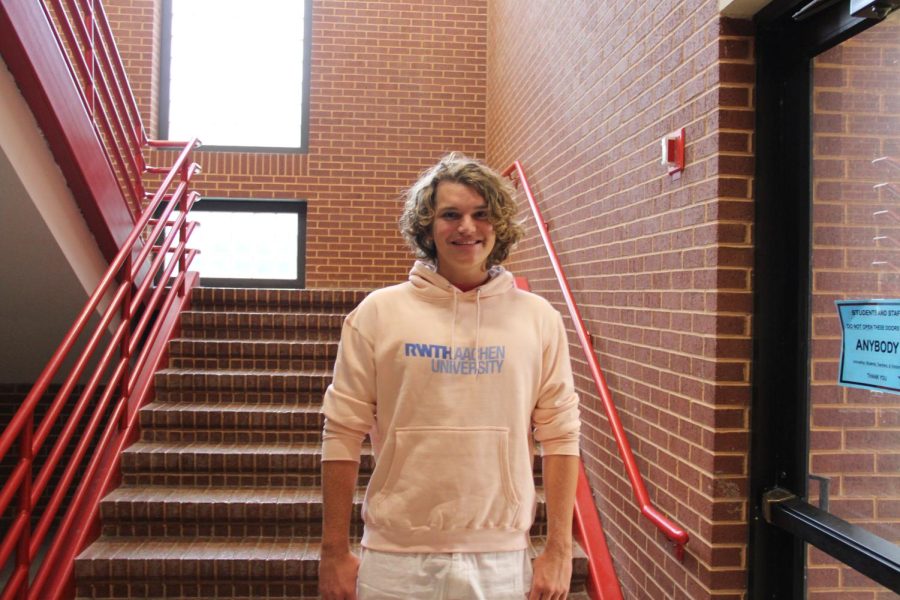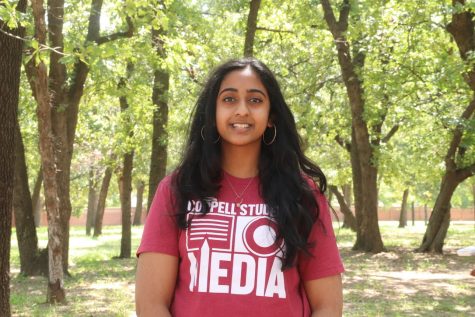Committing the challenge
Collins choosing to continue education in Germany
Coppell High School senior Sven Collins committed to a three-year program at RWTH Aachen University for computer science in Germany. Collins plans on taking a gap year in which he will serve as a Congress-Bundestag youth representative, studying and working abroad due to his vocational interests.
May 6, 2022
The Coppell High School senior class, much like its predecessors, will spot the United States with college commitments spanning most of the 50 states, but only a few will go abroad. CHS offers its junior and senior year students the perfect stepping stone to make that dream a reality, the International Baccalaureate (IB) program.
Coppell senior and future IB diploma holder Sven Collins grew up in the United States but visited Germany every summer, and plans to return to the European nation for his bachelor’s degree at Rheinisch-Westfälische Technische Hochschule Aachen University of Applied Sciences.
“I didn’t really want to lose the culture,” Collins said. “ It’s easy to just go to an American college and then live the rest of my life here. But that would really make me lose touch with something that is really important and I’d like to continue to have [that] as a part of my life.”
Having a mother of German descent helped Collins realize the importance of culture, and the gravity of culture shock. Collins has remained aware of happenings in Germany and values the country’s approach to education and focus on equity.
“I didn’t realize the value of cultural differences and how not everything in the U.S. is better,” Collins said. “There is a much smaller disparity between all educational institutions everywhere in Germany. Since education is government-funded, all the colleges are at a similar level, all the high schools are at a similar level. Here, there’s a huge difference. If you grow up somewhere like Coppell versus somewhere in a lower tax bracket, we get a lot more access to better resources.”
In contrast to the United States, many European universities have their students complete their concentrated bachelor’s degree in three years rather than four. This is what drew Collins to apply to a study abroad program that would act as a “gap year,” in some form before he began his term at RWTH Aachen.
He then applied to be a Congress-Bundestag youth representative while living with a host family. The program allows him to study and train in Germany for an academic year while gaining real-world work experiences and German language instruction. The program has a two percent acceptance rate.
Collins missed the first application deadline because of his other commitments on Dec. 1, but the deadline was pushed back one week. This grace period gave him time to ask his IB math Higher Level (HL) 2 teacher Ian Vanderschee and AP computer science teacher Michael Finnigan for recommendation letters and work on an introduction video showcasing his personality and interests.
Collins reached out to his friend, Coppell High School senior Jay Vanam in his IB English class, for help on the video. He knew he wanted to stand out rather than being another video filmed inside a bedroom with a blank backdrop. Vanam and Collins spent a Saturday creating a script, filming b-roll and putting together clips to create a high-quality video.
“I thought our efforts were pretty futile,” Vanam said. “I was hoping he would get in, but with a two percent acceptance rate, you never know. He kept calling me and texting me when he found out and I gave him a call right when I found out. It was just the last step and he needed an extra hand to help him, and I was happy to do it.”
When the news came out Collins was in math class after finishing a test, he checked his phone and found a missed call with a strange area code.
“It was a 201 area code with an Minn., and I didn’t recognize it,” Collins said. “Then I went back to the email to check the area code. I immediately stood there with my mouth open for five minutes. And then [the class] was like, “What are you doing? Call him back.” So I called him back. And then I realized I got in and I was overjoyed.”
While Collins had his backup plans in motion in case he failed to make the position, those who watched his application process were confident.
“I was less surprised than he was,” Vanderschee said. “He thought that he was not going to get accepted into the program and was considering backup plans. I knew he would be successful in the program because I have seen similar successes in the past with students taking risks and going outside of their comfort zones. Just based on who he is, his personality and the way he can sell himself I knew he would get in.”
Follow Anette (@AnetteVarghese) and @CHSCampusNews on Twitter.










